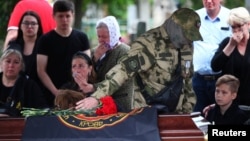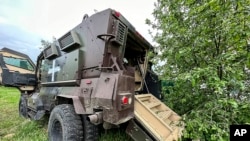New developments:
- Poll by University of Chicago's Harris School of Public Policy and NORC finds half of people in the United States support U.S. military aid for Ukraine, while about one-fourth oppose it. The level of support is nearly unchanged from last year.
- United Nations says it recorded nearly 8,000 civilian deaths in Ukraine since Russia invaded last year, as it warned the world is failing to protect civilians.
The toll of casualties is fast mounting in Ukraine, with the head of the Russian paramilitary Wagner Group saying Wednesday that 20,000 of his men have been killed in the lengthy fight for the eastern Ukrainian city of Bakhmut.
Yevgeny Prigozhin said about half of those killed in the battle for control of Bakhmut were Russian convicts who were promised their freedom from sentences for criminal offenses if they fought in Ukraine for six months. But the mercenaries were often sent to the battlefront with scant training and often were killed soon after in fierce combat with better-trained Ukrainian troops.
White House officials said Prigozhin’s casualty estimate was in line with their own that Russian losses have accelerated. Russia claimed in recent days it has captured Bakhmut, while Ukrainian officials say they have not given up the fight for the city and are trying to surround it.
Casualty figures for the now 15-month conflict have varied widely, depending on the source of the information. Prigozhin’s estimate for Bakhmut alone stands in sharp contrast to Moscow’s widely disputed claim that just over 6,000 of its troops had been killed as of January, about 11 months into the war.
The U.S. estimated this month that Russia had sustained 100,000 casualties, including 20,000 killed in the fighting, half of them Wagner forces, since December alone. Analysts say Ukraine has also lost thousands of its troops, although Kyiv has not said how many.
U.N. Office of the High Commissioner for Human Rights says that from February 2022 until early April 2023, it recorded 22,734 civilian casualties in Ukraine: 8,490 killed and 14,244 injured.
Prigozhin, despite his forces fighting alongside Moscow’s troops, has been a frequent critic of Russian defense leadership, claiming Moscow has not supplied Wagner with enough ammunition.
In an interview published late Tuesday with Konstantin Dolgov, a pro-Kremlin political strategist, Prigozhin extended his criticism — questioning some of Russian President Vladimir Putin's rationale for the war. Prigozhin said Russia's stated goal of "demilitarizing" Ukraine has backfired because Kyiv's military has become stronger with Western weapons and training.
Asked why Prigozhin would make the Bakhmut death toll claim, White House National Security Council spokesman John Kirby said, “It’s possible that this could be a sort of morbid way of him ... claiming credit for whatever they've been able to achieve in Bakhmut, but also trying to publicly embarrass the Ministry of Defense further that the cost was borne in blood and treasure by Wagner, and not by the Russian military."
Russia: Belgorod under attack again
A Russian official said Wednesday the Belgorod region along the border with Ukraine came under attack by drones overnight.
Belgorod Governor Vyacheslav Gladkov said on Telegram that administrative and residential buildings were damaged, but that no one was hurt.
Gadkov said Russian air defenses shot down most of the drones.
The attack came a day after Russia said it halted a cross-border ground attack in the same area.
Russia blamed the raid on Ukrainian military saboteurs, while Ukraine contended that it was an uprising against the Kremlin by Russian partisans.
Russian Defense Minister Sergei Shoigu said Russia will react “promptly and extremely harshly” to further attacks on Russian soil.
Bakhmut fight
Ukraine's military said Wednesday the focus of fighting was in Bakhmut and Marinka, with the probability of Russian forces attacking Ukraine with missiles and air strikes remaining high.
The Ukrainian military's general staff said in its daily update that Russia had launched 41 airstrikes during the past day, and that the attacks injured civilians while also damaging civilian and administrative buildings.
Pentagon Press Secretary Brig. Gen. Pat Ryder told reporters Tuesday the situation in Bakhmut remains “very dynamic.”
Russia claimed to capture the city that has been the focus of months of intense fighting. Ukraine said it was still in control of some areas on the outskirts of the city.
Ryder also told reporters the U.S.-led Ukraine Defense Contact Group is expected to focus on ground-based air defenses, ammunition and training on F-16 fighters when they hold their next meeting Thursday.
Peace effort
The speaker of the Czech Parliament’s lower house, Markéta Pekarová Adamová, told VOA that peace talks are not possible right now since Russian troops occupy parts of Ukraine and that the peace plan put forward by China includes contradictory points.
Ukrainian President Volodymyr Zelenskyy has said peace talks cannot happen until Russia pulls its forces from occupied Ukrainian lands.
Pekarová Adamová said Tuesday during a visit to Washington that Europe cannot accept Russia’s occupation of Crimea, Donetsk or Luhansk, areas that Russia has claimed as its own.
“The end of the war must be when really Ukrainians decide that this is acceptable on the conditions of the best for them,” Pekarová Adamová said.
She also said Russia needs to be punished through a special tribunal, not only President Vladimir Putin but also “all people who are responsible.”
Pekarová Adamová expressed support for continuing military aid to Ukraine, “because they show us they are really brave and do their best to protect their country and their people.”
State Department Counselor Derek Chollet told VOA the best thing China could do to bring about an end to the conflict is use its relationship with Russia to convince Putin to halt the invasion.
“Clearly, they have a close relationship with Russia. President Xi [Jinping] and President Putin have met several times, and before this war, they released a very lengthy joint communique talking about a relationship, a partnership with no limits. What we would be asking our PRC friends to do is use whatever influence they have over Russia to get Putin to stop this war,” Chollet said. “I haven't seen much to suggest that they're willing to use that influence. And I haven't seen much to suggest that even if they were willing to use the influence, it would work to change Putin's mind. But that's the simple thing we're asking.”
VOA’s Nike Ching and Carla Babb contributed to this report. Some information for this report came from The Associated Press, Agence France-Presse and Reuters.










